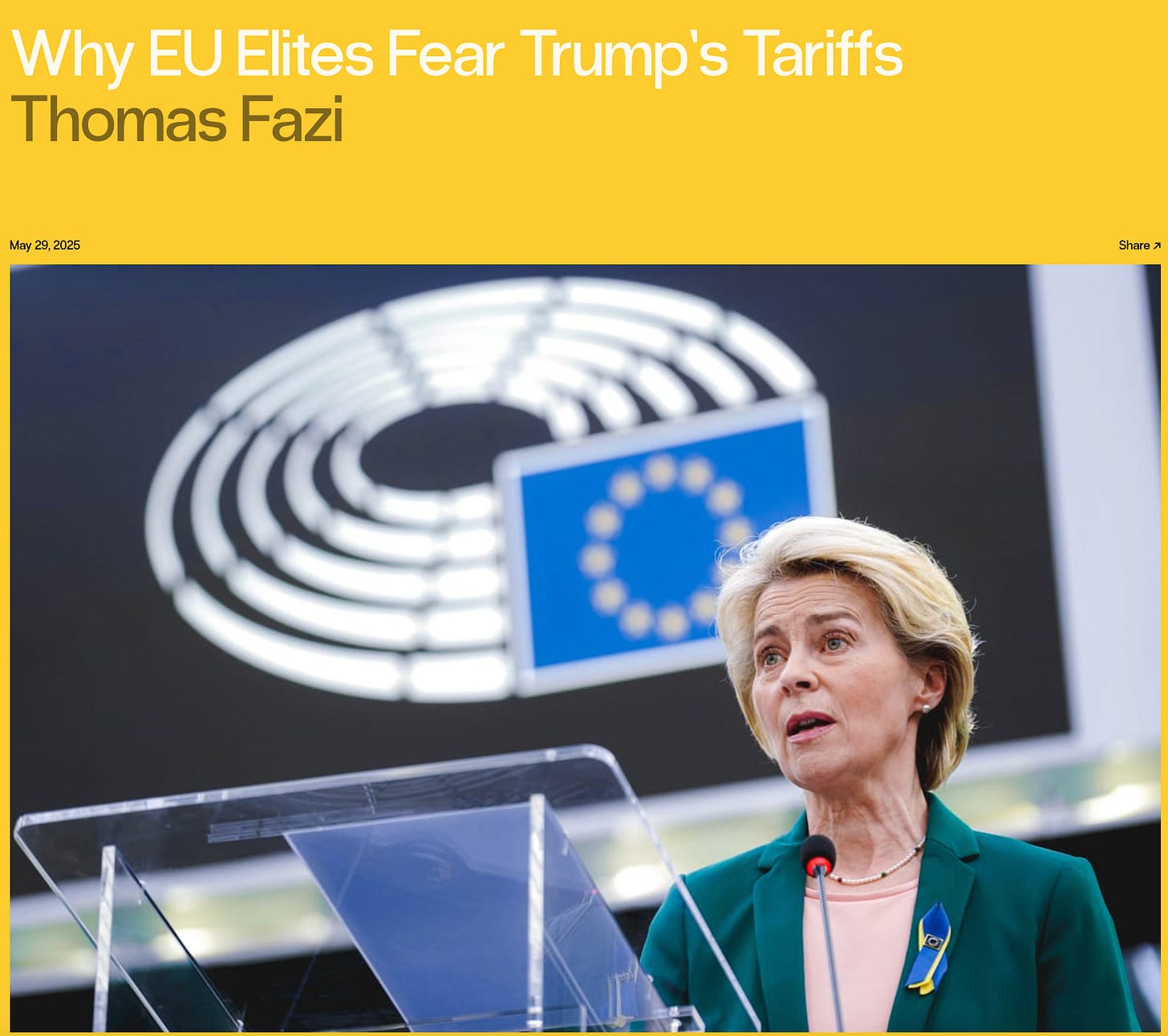Why EU elites fear Trump’s tariffs
Trump's upending of the global free regime threatens the foundation of their power
I’ve written for Compact about the deep structural reasons why European elites are freaking out at Trump’s EU tariffs. This is not about GDP losses or job losses (though these are real risks), but because Trump’s upending of the global free regime threatens the foundation of their power.
To understand why, it’s essential to grasp the crucial role that the EU’s mercantilist regime has played, and continues to play, in entrenching the power of its political and economic elites. At its core, an export-led growth model offers a structural solution to one of capitalism’s most enduring contradictions: the tension between wage suppression and consumer demand.
In capitalist economies, suppressing wages boosts profits in the short term by lowering labour costs. But it also weakens workers’ purchasing power, thereby undermining the very demand businesses depend on to sell goods and generate revenue. Since lower-income earners tend to spend a higher share of their income, reducing their earnings translates into weaker aggregate demand, stagnating consumption and ultimately declining profitability.
The economically rational response would be to increase wages and pursue full employment, thereby stimulating domestic demand and creating a more stable, inclusive economy. However, this poses a political threat to elites, because a well-paid, securely employed working class gains bargaining power, which in turn erodes the dominance of capital in both the workplace and the political arena. This is what motivated the eventual elite backlash against the postwar full employment regime in the 1980s, a development predicted four decades earlier by Polish economist Michał Kalecki.
The export-oriented model is attractive to ruling elites because orienting production toward foreign markets allows them to sidestep the need for strong internal demand and avoid empowering domestic labour. In effect, it externalises demand, allowing them to maintain a workforce that is underpaid, precarious, and politically weakened, while still sustaining economic growth and boosting profitability.
In the European Union, particularly in Germany, this model has been elevated to a systemic imperative to prioritise competitiveness, wage restraint, and fiscal austerity over domestic well-being. It is not merely an economic strategy, but a political project—one that subordinates democratic and social objectives to profits, export performance and global market discipline.
Read the article here.
Putting out high-quality journalism requires constant research, most of which goes unpaid, so if you appreciate my writing please consider upgrading to a paid subscription if you haven’t already. Aside from a fuzzy feeling inside of you, you’ll get access to exclusive articles and commentary.
Thomas Fazi
Website: thomasfazi.net
Twitter: @battleforeurope
Latest book: The Covid Consensus: The Global Assault on Democracy and the Poor—A Critique from the Left (co-authored with Toby Green)




The Europeans are just vassals of the US.
Include this with Russiaphobia and you have the answer.
What the EU NEVER realised is: The competition between the 2 "nations."
In many ways we in your Europe have lived 'on the back' of US Imperialism which led us to EXPECT continued support in war.
Sanctions finally have led the Europeans to understand they are on their own....good.
I loathe and detest Trump BUT he has caused chaos in Europe. They were not prepared which they should have been.
Instead of Diplomatic relations with Russia (God forbid) they are running around like 'chickens without heads.'
Did Europe look forward? NO
As the US declines so will Europe AND the EU
What the drump admin is doing is not just "raising tarrifs". Too many people seem to take the claim at face value and this is not good analysis.
If you look closely what they are actually aiming to do is far beyond a matter of tarrifs. In every case they have immediately listed a whole bunch of that they call non-tarrif barriers. BY this they mean very "minor" things like regulation, public/government provision or services instead of privatrization. So for example having food standards that ban GMO products or that ban crops grown the the cancer causing chemical Roundup, or for example having government run medical services instead of the privatize catastropher they have in the US.
This in fact why the US was unable to come to agreement with the US. Note the EU already imposed its own tarrifs on China very gladly, inconcert with the US.
In short what is actually going on with this so called tarrif war is in fact the US's third or foruth attempt to impose what it previously called the TPP/TTIP "trade deal".
People need to wake up and look in the details. Not just headlines.